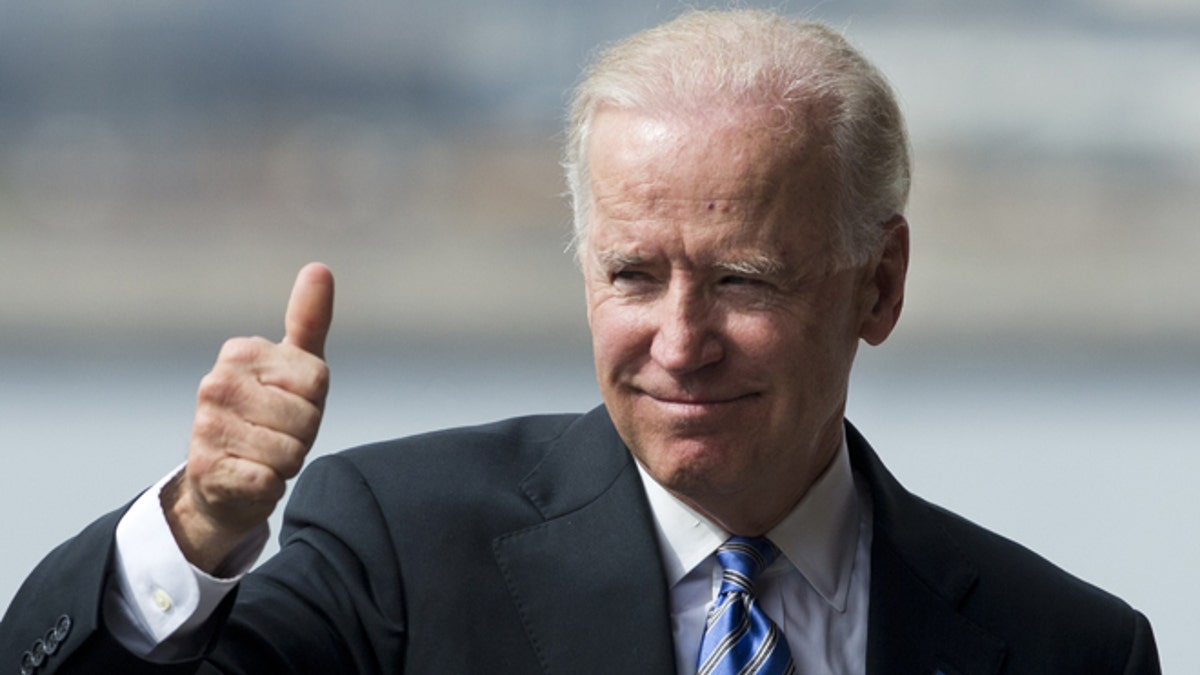
U.S. Vice President Joe Biden gives a thumbs up after giving a speech in Rio de Janeiro, Brazil, Wednesday, May 29, 2013. (AP2013)
RIO DE JANEIRO – United States Vice President Joe Biden heaped on praise to Brazil during a stopover in the country. During a speech Wednesday he said the Latin American giant is no longer a developing nation and is envied by many for its economic leap forward.
Biden is on the final leg of a six-day swing through Latin America and the Caribbean, a trip meant to foster deeper trade and diplomatic ties and pave the way for a state visit to the U.S. by Brazilian President Dilma Rousseff later this year.
"No longer can Brazil talk about being an 'emerging' country. You have emerged, you have engaged and you have had a positive impact on the world," Biden said, citing the country as an example in terms of food security and the recent write-off of about $900 million in African debt.
"Brazil has long since taken its place as one of the world's leaders. It is the seventh-largest economy in the world — bigger than India and bigger than Russia," he added.
However, for Riordan Roett, director of the Latin American studies program at Johns Hopkins University's School of Advanced International Studies, Brazil "is still an emerging country."
- Boston Bombing Creates Concern Over Brazil’s World Cup Safety
- Brazilian 2010 Census Highlights Racism Problem
- Brazil: Gorgeous Grandmother Wins Most Beautiful Elderly Woman Contest
- Brazilian Government Accused Of Failing To Protect Indigenous
- Brazilian Surfer Bruna Schmitz Hopes To Catch A Wave Of Fame
- Best Sports Pix Of The Week
- Brazil Drug Dealers Say No to Crack in Rio
"It is farther down the road than it was 25 or 30 years ago, but if you look at the World Economic Forum report on competitiveness, Brazil still ranks way down in the 40s and 50s of all the countries," Roett said.
He added that Brazil ranks "terrible in terms of education, science and math, physics, infrastructure. It has come a long way but it certainly is not where we hoped it would be 10 or 12 years ago."
Biden met with officials from state-run energy company Petrobras after his speech at the Maua pier in downtown Rio, continuing a push on energy issues that he also addressed during earlier stops in Colombia and in Trinidad and Tobago.
The White House said it will roll out the red carpet for Rousseff for a state visit in October. Rousseff and Obama met at the White House in April 2012 and during Obama's visit to Brazil two years ago.
White House spokesman Jay Carney said Rousseff's Oct. 23 visit will also include the first state dinner of Obama's second term, an important diplomatic acknowledgment of Brazil's growing influence — and also a shift back toward the middle for Brazilian foreign policy under Rousseff.
Her predecessor, Luiz Inacio Lula da Silva, supported the Iranian government of President Mahmoud Ahmadinejad and Venezuela's late president Hugo Chavez, both of whom Rousseff kept at arm's length.
"It is not so much that Rousseff has strengthened ties with the U.S. but that Brazil now has a less ambitious foreign policy, and a less defiant posture towards the U.S., than it did during the Lula period," said Michael Shifter, president of the Washington-based Inter-American Dialogue. "Lowering the temperature in Brazil's rhetoric on the global stage has opened up space for greater cooperation with Washington."
That the discovery of extensive offshore oil deposits near Brazil's southeastern coast could mean that the nation may "conceivably become an energy superpower in coming years," Shifter said. "Such a development would be attractive to the U.S., which is keen to reduce reliance on Middle East oil."
Brazil emerged from a 1964-85 military dictatorship only to be hit with repeated economic crises and hyper-inflation that most harshly punished the impoverished, widening an already yawning gap between rich and poor. But an economic plan put in place in the mid-1990s by former leader Fernando Henrique Cardoso, and massive social spending implemented by Silva, have helped transform Brazil.
"In 20 years you have written a great story. You broke inflation. Lifted 40 million people out of poverty and into the middle class," Biden said mentioning Brazil's social programs such as "Zero Hunger" which he said are "studied and copied around the world."
"The rest of the world looks at you with envy," he added. "You can no longer claim you are a developing nation. You have developed and with that comes the responsibility to speak up."
After a round-table discussion with business leaders, Biden met briefly with reporters.
"The thing that I marvel the most about the progress made over the last decade or two in Brazil is that they demonstrated that you don't have to choose between development and democracy," Biden said. "You don't have to choose between a free market system and real growth and opportunity. That is a lesson the world has seen."
Biden planned to tour a slum Thursday before heading to Brasilia for a Friday meeting with Rousseff.
Based on reporting by The Associated Press.
Follow us on twitter.com/foxnewslatino
Like us at facebook.com/foxnewslatino












































